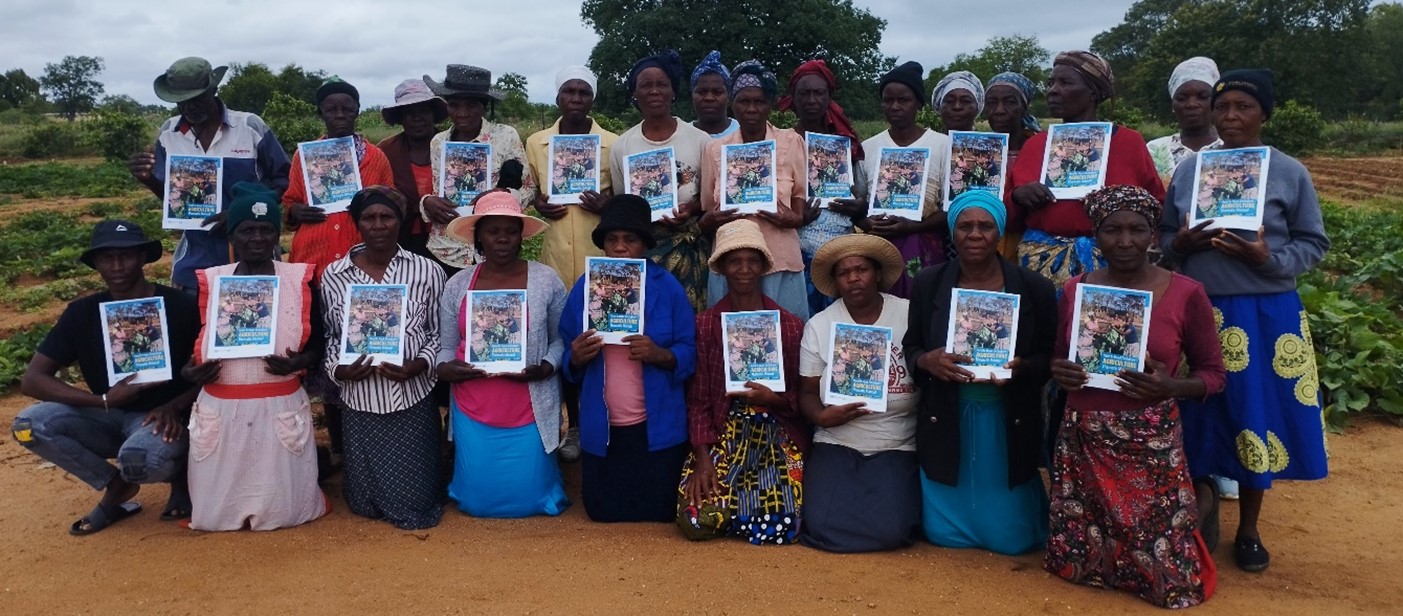Some of the Progressive Garden members after receiving horticulture production work sheets
Previously, the garden members experienced low crop quality, diminished profits and other post-harvest losses from their horticulture due to limited knowledge on quality crop production and post-harvest handling techniques.
After receiving support under the HOVAWEEP there were positive changes noted. Members received solar-powered fruit and vegetable drying machines, establishment of a fruit and vegetable processing centre, start-up kit through seeds and pesticides, among other materials. This was meant to assist the farmers increase production capacity and enable them to handle the post-harvest losses. The beneficiaries also received trainings on business management, high value horticulture production, fruit and vegetable drying, product branding and packaging, commodity cluster formation, natural resources management and gender issues among other trainings support.
This significantly enabled the group to engage in internal savings and lending of US$3 per member at 10 percent interest.
Progressive garden farmers participating in horticulture production training
Within a short space of time, the farmers now produce high value horticulture crops such as tomatoes, leaf vegetables, butternuts, green pepper among others. In this area, vegetables have a high market demand and this has motivated the PG to supply both internal and external markets. From the total harvest of 2 162kgs of tomatoes, the PG has satisfied the market with 1 860kgs, and 302kgs have been for households use.
Farmers at Progressive harvesting their tomatoes in July 2023
“After receiving support from the HOVAWEEP we experienced improved production and became active in the horticulture value chain. As we speak, we have started harnessing incomes that have enabled us to partly cover for our household needs through the sales made from selling tomatoes,” said Tsemukang Sebata, one of the garden members.
From the production trends, the recent figures indicate that the farmers have nearly doubled their production capacity after receiving support under the HOVAWEEP as tabulated below.
| Tomatoes | Leafy Vegetables | Butternuts | ||||
| Year | 2022 | 2023 | 2022 | 2023 | 2022 | 2023 |
| Yield | 1205kgs | 2162kgs | 16 bundles per month per member | 28 bundles per month per member | 955kgs | 1410kgs |
The table showing a comparison of different horticulture crops before and during HOVAWEEP.
PG members indicated that besides supplying their products to various markets, recipients now enjoy nourished diets with their families. One of the quoted members said: – “We have supplied markets as far as Insiza District and our families now consume nutritious diets from our horticulture produce.”
Farmers of the Progressive Garden showcasing their harvested tomatoes
Now the garden has become the learning centre for many farmers within and outside Gwanda District.
As business model, farmers hinted that they have met and overcome different project challenges including adverse weather conditions, accompanied by the water table decline leading to limited water supplies to the garden.
For their short term and future plans, farmers revealed that they want to start add value to their produce through processing, branding and packaging their produce before taking it to the market. Garden members also indicated that they have started the process of registering as a Private Business Corporation (PBC) in order to start formally trading with established markets. From this month, the garden is intensively embarking on vegetable value addition so as to supply the market with packaged and branded dried vegetables. Anticipatorily, this will increase the income base of beneficiaries leading to sustainable strategies in addressing and handling post-harvest losses.
Vegetable drying process demonstration being done at Progressive Garden
PG farmers appreciate the support of Hand in Hand Zimbabwe through its HOVAWEEP and wish that the project can spread to other communities. It has been noted that most rural farmers fail to penetrate external markets due to challenges ranging from low product quality, low volumes produce and low profits, mostly emanating from failure to handle post-harvest losses. Projects as HOVAWEEP can provide a long-lasting solution if implemented in other communities and benefit a large number of rural people, in particular, women.

